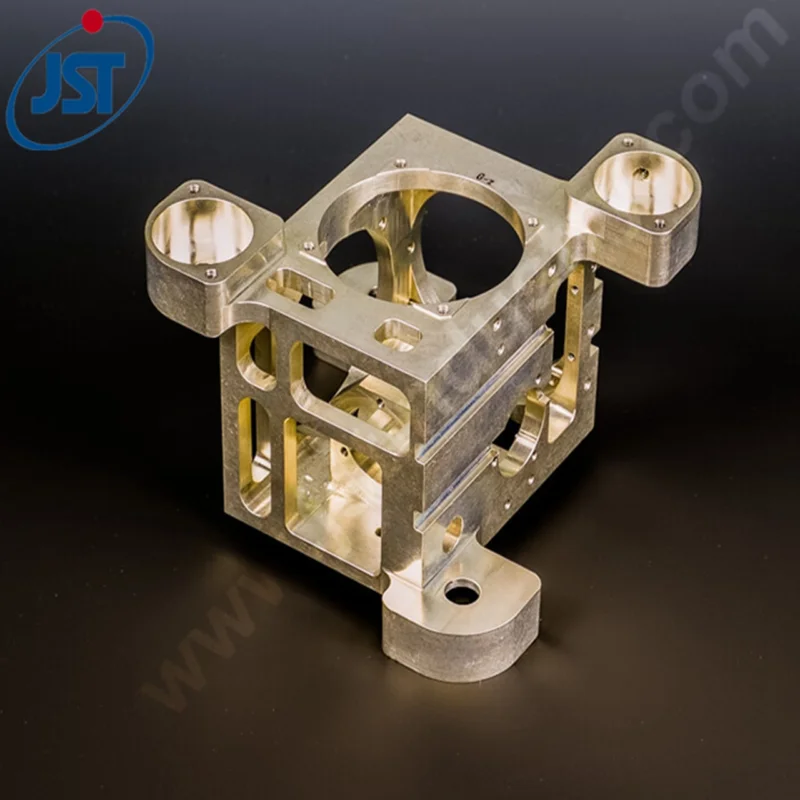JST Industrie
Bietet professionelle CNC-Messingbearbeitung
Vorteile der Bearbeitung von Messing
Messing ist als Werkstoff mit hervorragenden mechanischen Eigenschaften und schönen Oberflächen in vielen Branchen unersetzlich. Hier sind einige der wichtigsten Vorteile, die die Wahl von Messing für die CNC-Bearbeitung mit sich bringt:
Gute mechanische Eigenschaften
Messing ist leicht zu bearbeiten, hat eine gute Duktilität und Ermüdungsfestigkeit und eignet sich für die Herstellung von Präzisionsteilen.
Ästhetisch ansprechende Oberflächen
Die natürliche Farbe und der Glanz von Messing machen es sehr beliebt für dekorative Anwendungen.
Korrosionsbeständigkeit
Messing hat eine gute Beständigkeit gegen atmosphärische Korrosion und ist für Umgebungen geeignet, die eine hohe Korrosionsbeständigkeit erfordern.
Wärmeleitfähigkeit
Die Wärmeleitfähigkeit von Messing eignet sich für Teile, die Wärme ableiten müssen, wie Musikinstrumente und bestimmte elektronische Geräte.
Eigenschaften und Anwendungen von Messing
JST Industry bietet CNC-Bearbeitungsdienstleistungen für eine breite Palette von Messingwerkstoffen an, um den spezifischen Anforderungen der verschiedenen Industrien in Bezug auf die Materialeigenschaften gerecht zu werden.

Abnutzungswiderstand
Die Verschleißfestigkeit von Messing macht es ideal für Lager und Zahnräder.

Musikinstrument
Aufgrund seiner akustischen Eigenschaften wird Messing häufig für die Herstellung von Musikinstrumenten wie Trompeten und Blechblasinstrumenten verwendet.
Ventile und Armaturen
Die Korrosionsbeständigkeit und die Festigkeit von Messing machen es zu einem idealen Werkstoff für Armaturen und Fittings.

Elektrische Komponenten
Aufgrund der elektrischen Leitfähigkeit von Messing eignet es sich für Steckverbinder und Klemmen in der Elektro- und Elektronikindustrie.

CNC-Messing-Bearbeitungsteile
Oberflächenbehandlungen und Veredelungen von Messing
JST Industry bietet nach der CNC-Bearbeitung von Messingteilen eine Vielzahl von Endbearbeitungsoptionen an, um das Aussehen, die Haltbarkeit und die Funktionalität des Produkts zu verbessern.

Polieren: Vom Grobpolieren bis zum Hochglanzpolieren stehen verschiedene Glanzoberflächen zur Verfügung, um die unterschiedlichen Bedürfnisse unserer Kunden zu erfüllen.
Überzug: Enthält Vernickelung und Verchromung zur Verbesserung der Verschleiß- und Korrosionsbeständigkeit von Messingteilen.
Passivierung: Verbessern Sie die Korrosionsbeständigkeit von Messing durch Passivierungsbehandlung für anspruchsvollere Anwendungen.
Fälle von Messingbearbeitung und Rückmeldungen
Schweizer Uhrenhersteller
"Auf der Suche nach einem Partner, der Uhrenteile präzise bearbeiten kann, haben wir uns für JST Industry entschieden, deren Beherrschung der Bearbeitung von Messingwerkstoffen und strenge Aufmerksamkeit für Details zu einer branchenführenden Präzision und Langlebigkeit unserer Uhrwerkskomponenten geführt hat. Der professionelle Service und das Engagement von JST Industry für Qualität haben unseren Produkten einen ausgezeichneten Ruf auf dem High-End-Markt eingebracht."
Automobilsensorhersteller, Stuttgart, Deutschland
"Für die Präzisionsmessingteile unserer Kfz-Sensoren hat JST Industry hervorragende Bearbeitungsfähigkeiten bewiesen. Ihre präzise Kontrolle der Toleranzen und ihr tiefes Verständnis der Materialeigenschaften gewährleisten die Konsistenz und Zuverlässigkeit unserer Produkte. Darüber hinaus haben die von JST Industry angebotenen Rapid-Prototyping-Dienstleistungen unseren Entwicklungszyklus erheblich verkürzt und unsere Wettbewerbsfähigkeit auf dem Markt verbessert."
Unternehmen für medizinische Geräte, Boston, USA
"Im Bereich der Medizintechnik, wo Produktgenauigkeit und Oberflächenqualität von größter Bedeutung sind, erfüllen die CNC-Messingbearbeitungsdienste von JST Industry unsere strengen Anforderungen und ihre Teile entsprechen unseren hohen Standards für Maßgenauigkeit und Oberflächengüte. Das engagierte technische Supportteam von JST Industry war während des Projekts äußerst hilfreich und hat die erfolgreiche Entwicklung unseres Produkts sichergestellt."
Hersteller hochwertiger Musikinstrumente, Tokio, Japan
"JST Industry liefert nicht nur hochwertiges Messingmaterial, sondern durch ihre präzisen CNC-Bearbeitungstechniken sind unsere Instrumente auf dem neuesten Stand der Technik in Bezug auf Klangqualität und Aussehen. Die individuelle Anpassung und die Hingabe zur Handwerkskunst haben dazu geführt, dass unsere Instrumente bei professionellen Musikern sehr gut ankommen."
FAQs
F: Ich entwerfe ein neues Produkt, das eine CNC-Bearbeitung erfordert, um einen Prototyp und ein Endprodukt herzustellen. Wie wähle ich das am besten geeignete Material für die CNC-Bearbeitung für mein Projekt aus?
A: Wir bei JST Industry wissen, dass die Wahl des richtigen CNC-Bearbeitungsmaterials für das Produktdesign entscheidend ist. Sie sollten zunächst das Szenario berücksichtigen, in dem Ihr Produkt eingesetzt werden soll, einschließlich der erforderlichen mechanischen Eigenschaften, Temperaturbeständigkeit, Korrosionsbeständigkeit und Kosteneffizienz. Wir bieten eine breite Palette von Werkstoffen an, unter anderem Aluminiumlegierungen, Edelstahl, Messing, verschiedene Legierungen und viele Kunststoffe. Unser Expertenteam unterstützt Sie bei der Auswahl des für Ihre spezifischen Anforderungen am besten geeigneten Materials und berät Sie bei der Designoptimierung, um einen effizienten und kostengünstigen CNC-Bearbeitungsprozess zu gewährleisten.
Q: Ich würde gerne wissen, wie sich die Auswahl verschiedener Materialien bei der CNC-Bearbeitung auf die endgültigen Bearbeitungskosten auswirkt?
Wir bei JST Industry sind uns bewusst, dass die Materialauswahl einen erheblichen Einfluss auf die Kosten der CNC-Bearbeitung hat. Die Art des Materials, die Schwierigkeit der Bearbeitung und die Marktverfügbarkeit wirken sich alle auf seinen Preis aus. So wird beispielsweise Stahl aufgrund seiner geringeren Kosten häufig verwendet, während Titanlegierungen und bestimmte hochentwickelte Legierungen aufgrund ihrer höheren Materialkosten und Bearbeitungsschwierigkeiten teurer sind. Darüber hinaus wirkt sich auch die Bearbeitbarkeit des Materials auf die Kosten aus, z. B. sind Aluminiumlegierungen aufgrund ihrer leichten Bearbeitbarkeit in der Regel preiswerter. Unser Kostenvoranschlagssystem berücksichtigt all diese Faktoren, damit Sie einen möglichst genauen Kostenvoranschlag erhalten.
Q: Welche Konstruktionsverfahren können mir helfen, die Bearbeitungskosten bei der Konstruktion von CNC-bearbeiteten Teilen zu senken?
F: Ich habe strenge Anforderungen an die Genauigkeit meiner Produkte. Welche Toleranzen können mit CNC-Bearbeitung erreicht werden und wie wirkt sich dies auf die Qualität des Endprodukts aus?
A: Bei JST Industry sind unsere CNC-Bearbeitungsdienste in der Lage, extrem hohe Toleranzen einzuhalten, oft bis zu ±0,01 mm, dank unserer fortschrittlichen Bearbeitungsausrüstung und strengen Qualitätskontrollverfahren. Diese hochpräzise Bearbeitung gewährleistet die Konsistenz und Zuverlässigkeit der Teile, was besonders wichtig für Baugruppen ist, die eine hochpräzise Passung erfordern. Unser Qualitätssicherungssystem umfasst mehrere Prüfungen und Kalibrierungen, um sicherzustellen, dass jedes Teil mit den Konstruktionszeichnungen und Toleranzen des Kunden übereinstimmt und somit die Qualität des Endprodukts gewährleistet ist.




